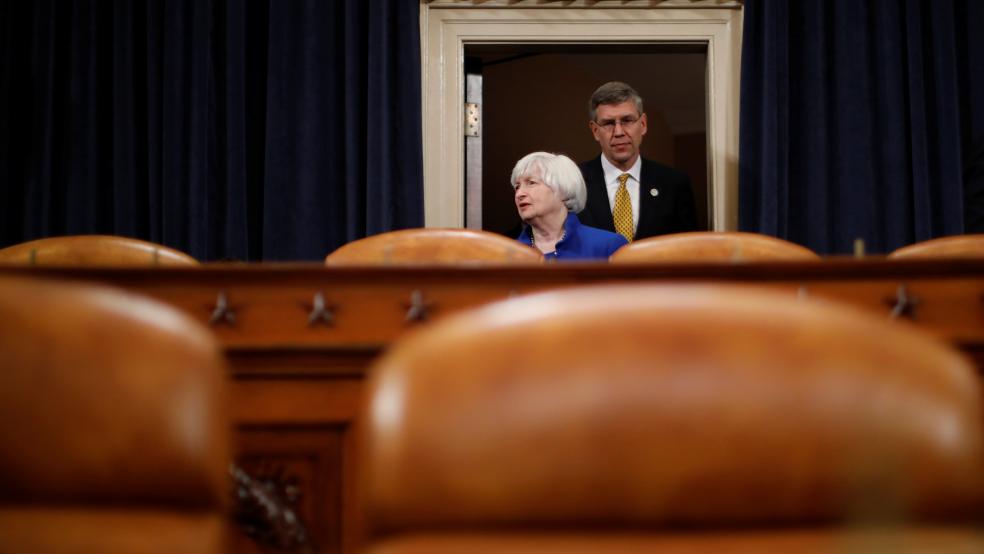Tomorrow, the Senate will decide whether to allow the so-called ‘audit the Fed’ bill to come to the floor for a vote, and while top officials at the central bank are likely deeply unhappy about the Federal Reserve Transparency Act of 2015 (it was introduced last year) they typically don’t go public with criticism of Congress.
That restriction doesn’t apply to former Fed officials though, and in an article posted on the website of the Brookings Institution, where he is a distinguished fellow in residence, former Fed chair Ben Bernanke said the bill would “provide a vehicle for members of Congress to apply political pressure on the Fed” in a way that would make the already-challenging process of setting monetary policy even more difficult.
Related: The Fed Just Raised Rates. Here’s What It Means for Your Money
In a Time Magazine article published Sunday, Paul and his senior economic adviser Mark Spitznagel called the central bank “a political, oligarchic force, and a key part of what looks and functions like a banking cartel.”
Paul said that particularly in the wake of the financial crisis, in which the central bank played a leading role in the bailout of insolvent financial institutions, “We actually don’t know the full extent of or the precise recipients of the Fed’s asset purchases and bailouts as its balance sheet exploded from about $900 billion in August 2008 to almost $4.5 trillion today.”
They conclude, in support of the bill, “Clearly, the country needs to understand fully the extent of the Fed’s balance sheet: what it holds and from whom it was acquired, as well as all of the Fed’s other activities and conceivably even more dangerous shenanigans afoot.”
The bill, which has been championed by Kentucky senator and GOP presidential candidate Rand Paul, seems reasonable on its face. The idea of auditing the central bank, in fact, is a no-brainer. The Fed has a balance sheet in the trillions of dollars, so failing to audit it would be colossally negligent. However, as Bernanke points out, the Fed is already extensively audited – and he obviously believes that Paul’s reference to “all of the Fed’s other activities” gives the game away.
Related: Here’s What Bernie Sanders Would Do to the Fed
“The Fed is already thoroughly audited in the usual sense, by an independent inspector general and by an outside accounting firm (currently, Deloitte and Touche), and the resulting financial reports are made public online,” Bernanke wrote. “Every security owned by the Fed, up to the detail of the identifying CUSIP number, is also available online. Moreover, the Government Accountability Office, which does in-depth reviews and analyses…of government activities at the request of Congress, has wide latitude to review Fed operations, including supervision and regulation as well as other functions.”
What the bill would do is open up the deliberations of the Federal Open Market Committee, the body responsible for setting interest rate targets, to Congressional scrutiny.
“The principal effect of the bill would be to make meeting-by-meeting monetary policy decisions subject to Congressional review and, potentially, Congressional pressure,” Bernanke wrote. “The bill would do this by repealing existing restrictions, imposed by Congress nearly forty years ago, on what the GAO can examine when reviewing the Fed.”
Related: Fed's New Rate-Hike Tools Passed Key Test, Fischer Says
Bernanke warned that should it become law, the Federal Reserve Transparency Act could allow Congress to require the GAO to examine the deliberations of the FOMC in real time and to provide alternative recommendations on how to set interest rates.
“The Fed should continue to strive to improve its transparency and accountability, and in particular to ensure that Congress has all the information it needs to fulfill its oversight responsibilities,” Bernanke said. “However, this goal is not best achieved by overturning longstanding practice and effectively inserting Congress and the GAO into monetary policy decisions, calling into question the Fed’s independence. The risk is that GAO reviews and recommendations concerning individual monetary policy decisions would provide a vehicle for members of Congress to apply political pressure on the Fed.”
Sen. Paul has been pushing his Audit the Fed bill for years, just as his father, former Texas Rep. Ron Paul, spent decades pushing similar legislation in the House. The odds are still against it, but with Republicans holding both Houses of Congress and strong Fed critics in key Committee positions in the House, where it has also been introduced, the Paul family’s quest to turn this legislation into law may never stand a better chance of being realized.
Or, at least, of getting it to the president’s desk.





